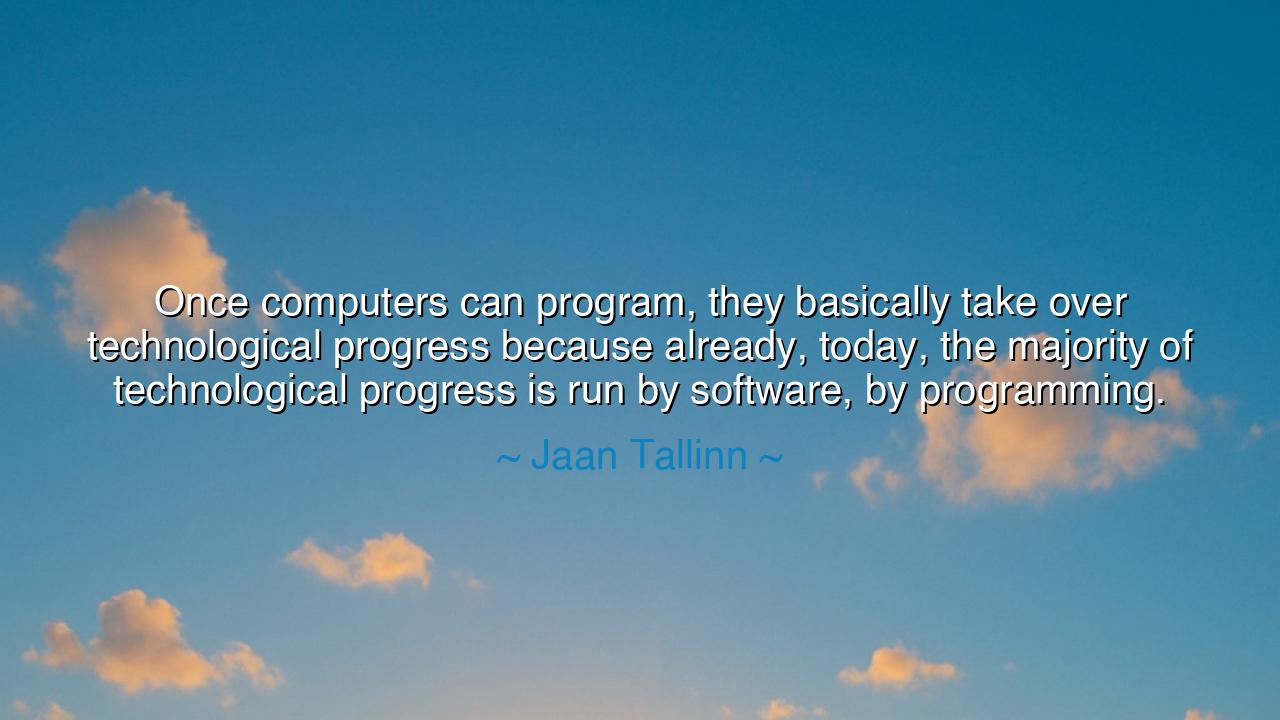
Once computers can program, they basically take over
Once computers can program, they basically take over technological progress because already, today, the majority of technological progress is run by software, by programming.






"Once computers can program, they basically take over technological progress because already, today, the majority of technological progress is run by software, by programming." – Jaan Tallinn
In the great unfolding of human history, there have always been moments when our creations—tools, machines, and innovations—have shaped the course of civilization. From the earliest stone tools crafted by our ancestors to the magnificent engineering marvels of ancient Egypt, each advancement has moved humanity forward. Yet, as Jaan Tallinn so astutely observes, we stand at the threshold of an even greater transformation: the rise of machines that can not only assist in human endeavors but directly drive progress themselves. Software, once merely a servant to human ingenuity, now holds the power to reshape the very nature of technological advancement. If computers can program, they will become the architects of their own evolution, guiding us into a future we can only begin to imagine.
In the ancient world, great civilizations were built upon the ingenuity of their creators—whether archimedes' mechanical devices or the massive aqueducts of Rome, each advancement was the product of human design and creativity. Yet, there was always a limit to what the human mind could conceive and accomplish alone. For all their brilliance, the tools of the past were still bound by the limitations of their creators. It is only in the modern world, with the rise of computers and programming, that we have created tools that have the potential to break free from these bounds, to advance independently, and even to create on their own. Tallinn’s words point to a future where machines not only serve humanity but take up the mantle of innovation, driving us toward a future of unprecedented progress.
The origin of this idea can be traced to the myth of Prometheus, the ancient Titan who stole fire from the gods to give to humans. Fire, a tool of great power, symbolized the advancement of civilization, yet it was also a force that could easily slip from human control. Just as Prometheus gave humanity a powerful tool, computers and programming have done the same: they have placed the power of creation and progress into our hands. Yet, just as Prometheus’ gift was both a blessing and a curse, so too does the rise of self-programming machines present both a boon and a challenge. With this gift of autonomy, we must tread carefully, ensuring that we do not lose control of the very forces we have set in motion.
Consider the Industrial Revolution, a time when machines transformed society, bringing about mass production, urbanization, and immense technological advancement. Steam engines, powered by human ingenuity, became the driving force behind progress. However, as powerful as these machines were, they were still fundamentally dependent on human design and operation. Today, we face a similar moment in history, but with a shift: rather than simply creating machines to serve us, we are creating machines that evolve through programming, and as Tallinn suggests, this shift could lead to a transformation in how technological progress unfolds. The machines that once served us may soon begin to drive the future themselves, sparking changes we have yet to fully understand.
This shift is perhaps most apparent in the rise of artificial intelligence. Machines like DeepMind and OpenAI are beginning to push the boundaries of what computers can do, and they are doing so with a level of autonomy that was once the domain of human beings alone. In 2016, AlphaGo, an AI developed by DeepMind, defeated the world champion at Go, a game long considered too complex for machines to master. This was not just a victory for AI, but a glimpse into a future where machines could not only execute tasks but also learn, adapt, and innovate independently. Tallinn’s words resonate with this shift: as machines grow increasingly capable of programming themselves, they may begin to direct technological progress in ways that were previously unimaginable, raising both excitement and concern about the consequences of such power.
The lesson in Tallinn’s reflection is one of caution and responsibility. Just as the ancients understood the power of creation and the dangers of unchecked ambition, we must now consider the implications of our technological creations. We must not merely celebrate the progress of machines, but also reflect on how to guide their evolution. The power to create is an incredible gift, but it is a gift that must be handled with wisdom and foresight. Just as the early inventors of the steam engine had to balance progress with the safety of society, so too must we approach the development of self-programming computers with a deep understanding of the potential risks and rewards.
As we stand at the threshold of this new era, let us not forget the wisdom of the ancients—that the true measure of progress lies not just in the tools we create, but in how we choose to use them. The rise of self-programming machines will undoubtedly shape the future, but it is up to us to steer that future in a direction that serves the greater good. Just as Prometheus brought fire to humanity, so too does the rise of artificial intelligence present us with both opportunity and responsibility. Let us embrace the future, not with fear, but with the wisdom to guide it, ensuring that our creations continue to serve humanity, rather than the other way around.






AAdministratorAdministrator
Welcome, honored guests. Please leave a comment, we will respond soon